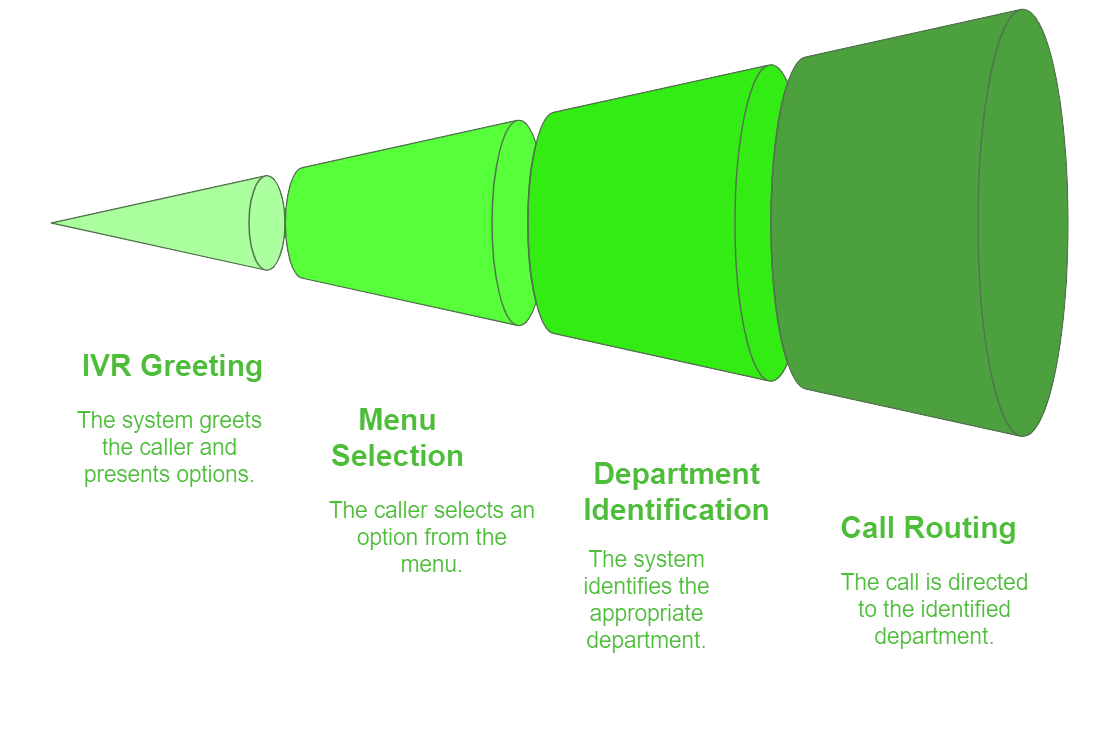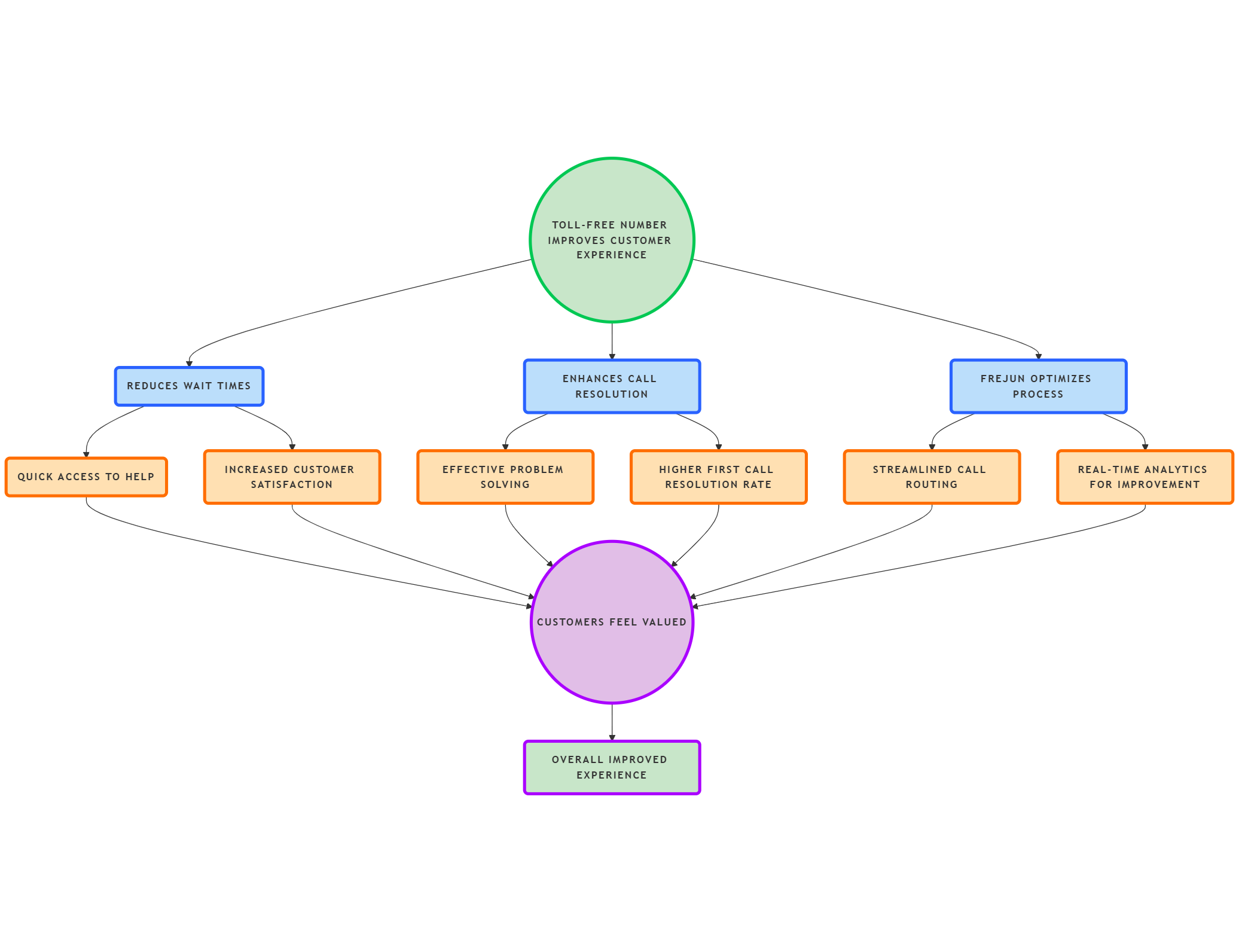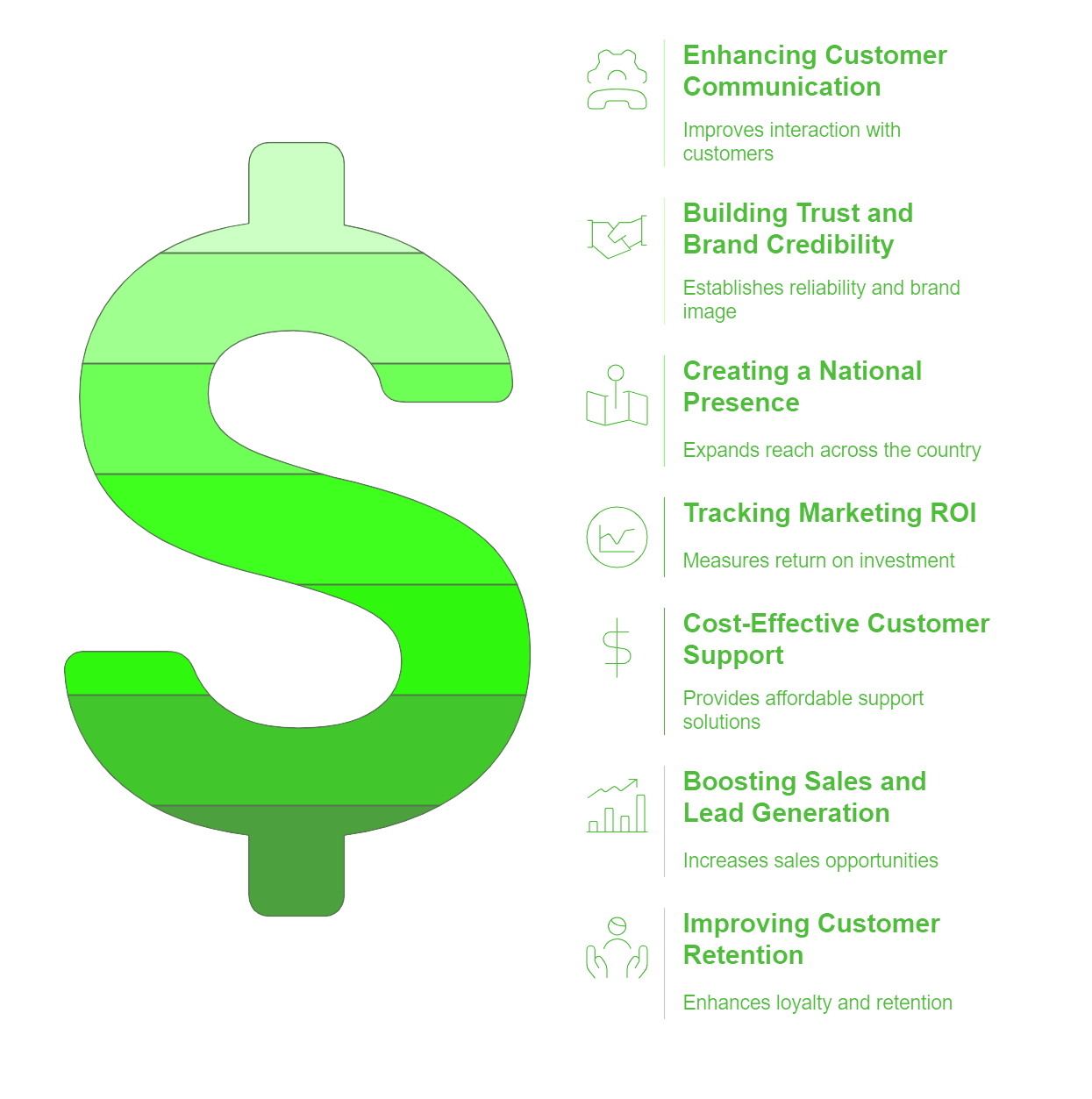Last updated on May 2nd, 2025 at 12:37 pm
In the modern business environment, staying accessible to your customers is more critical than ever. One of the most effective ways to ensure this accessibility is through a toll-free number. Over the years, businesses both large and small have increasingly embraced toll-free services as a key element of their communication strategies.
The reason is simple: these numbers enable customers to reach out without incurring any costs, thereby removing barriers to customer support or sales inquiries. As a result, businesses can foster stronger relationships, improve customer satisfaction, and ultimately drive more conversions. In an era where seamless communication is essential, toll-free numbers serve as a powerful tool to enhance customer engagement and trust.
In India, where businesses are expanding their reach across cities and regions, toll-free numbers ensure seamless, cost-free communication with customers. Solutions like FreJun provide businesses with advanced toll-free capabilities to enhance communication, optimize call management, and track campaign performance. This article dives deep into how to acquire a toll-free number, the benefits for various industries, key features to explore, and actionable steps to set up your toll-free system.
Table of contents
- How Can I Get a Toll-Free Number for My Indian Business?
- What is Toll-Free Number?
- Types of Toll-Free Numbers Available in India
- Essential Documents for Toll-Free Number Registration
- Customer Journey Before & After Implementing a Toll-Free Number
- Benefits of Toll-Free Numbers for Indian Businesses
- Toll-Free Number Features You Should Know
- Industries Leveraging Toll-Free Numbers
- How to Acquire a Toll-Free Number in India
- Cloud-Based Toll-Free Solutions
- Enhancing Marketing Campaigns with Toll-Free Numbers
- Conclusion
- Frequently Asked Questions
How Can I Get a Toll-Free Number for My Indian Business?
You can get a toll-free number by contacting telecom service providers or cloud telephony platforms. Providers like FreJun offer easy setup, call tracking, IVR, and analytics features to help Indian businesses manage and scale their customer communication efficiently.
What is Toll-Free Number?
A toll-free number is a special type of phone number that allows callers to reach a business or organization without incurring any charges. Instead, the business or organization that owns the toll-free number bears the cost of the call. Because of this, these numbers are widely used for customer service, sales inquiries, and technical support, ensuring that customers can easily connect without financial concerns.

In India, toll-free numbers typically begin with specific prefixes like 1800, 1801, or 1860, depending on the type and service provider. By offering free access for callers, toll-free numbers help businesses enhance the customer experience while also serving as a valuable tool for marketing, brand recognition, and customer support. As a result, they play a crucial role in strengthening customer relationships and improving overall business communication.
Types of Toll-Free Numbers Available in India
Toll-free numbers are essential for businesses looking to provide seamless communication with their customers. In India, there are various types of toll-free numbers, each catering to different needs and services. Here’s a quick look at the primary types available:
- 1800 Series (Universal Toll-Free Numbers): The most common and widely used toll-free number series in India is the 1800 prefix. These numbers are typically used by businesses to offer customer support, helplines, or inquiries without charging the caller. They are ideal for large organizations looking to connect with customers nationwide, ensuring no costs for callers.
- 1860 Series (Non-Geographic Toll-Free Numbers): The 1860 series is another popular toll-free number type. It works similarly to the 1800 series but is often used by businesses that want to offer services like customer support or product inquiries at a national level. The difference is that these numbers are more flexible in terms of service scope, especially for smaller or niche businesses.
- Vanity Numbers: Vanity toll-free numbers are customized numbers that are easy to remember, often featuring words or phrases related to the brand. For instance, a business could have a toll-free number like 1800-FLOWERS. These numbers are particularly effective for marketing purposes, helping brands stand out and become more memorable to customers.
- International Toll-Free Numbers (ITFS): Businesses with a global reach can opt for International Toll-Free Numbers. These numbers allow companies to offer toll-free access to customers located outside India, ensuring they can contact your business without incurring international call charges. ITFS numbers are beneficial for multinational companies and global customer service operations.
- Shared Toll-Free Numbers: Shared toll-free numbers are cost-effective options for small and medium-sized businesses. In this case, the toll-free number is shared among several businesses, and each business has a specific extension. While this is an economical option, it might not provide the level of customization and exclusivity that other toll-free numbers offer.
Essential Documents for Toll-Free Number Registration
| Document Type | Purpose |
| Business Registration | Verifies the legitimacy of the business. |
| Address Proof | Confirms business location. |
| ID Proof (Owner) | Ensures regulatory compliance. |
| GST Certificate | Required for tax and invoicing. |
Customer Journey Before & After Implementing a Toll-Free Number

Benefits of Toll-Free Numbers for Indian Businesses
Businesses across industries in India are increasingly realizing the advantages of implementing toll-free numbers. By providing a simple, cost-free communication channel for customers, businesses not only enhance accessibility but also improve their professional image. Furthermore, toll-free numbers contribute to measurable success in both marketing and customer support.

To better understand their impact, we will explore the numerous benefits in detail, along with real-world examples and valuable insights. By the end of this discussion, you’ll see how toll-free numbers can be a game-changer for businesses looking to strengthen customer relationships and drive growth.
1. Enhancing Customer Communication
One of the most significant advantages of toll-free numbers is their ability to facilitate seamless, uninterrupted, and cost-free communication between businesses and their customers. By completely eliminating the cost of calls for customers, businesses not only remove a major barrier to interaction but also encourage more frequent engagement. As a result, customers feel more comfortable reaching out whenever they need assistance, which ultimately leads to better support, stronger relationships, and higher customer satisfaction.
Why it Matters:
- Customers are more likely to call for support, inquiries, or complaints when they don’t have to pay.
- Toll-free numbers encourage real-time interaction, which builds trust and helps businesses resolve issues faster.
2. Building Trust and Brand Credibility
Toll-free numbers add a layer of professionalism and trust to a business. A customer-facing toll-free number signals reliability, as customers associate it with established, customer-centric organizations.
How it Builds Trust:
- Professionalism: Having a dedicated toll-free number projects the image of an organized and established company, regardless of its size.
- Transparency: Customers appreciate businesses that make themselves available without financial barriers.
- National Presence: Toll-free numbers work across geographic boundaries, creating an impression of a nationwide or even global operation.
3. Creating a National Presence
For businesses in India, toll-free numbers provide the opportunity to reach customers across cities, states, and regions without needing a physical presence in every location.
How Toll-Free Numbers Help:
- Customers can call the same toll-free number from anywhere in the country.
- Businesses can manage calls efficiently through advanced routing systems that direct inquiries to relevant departments or regional representatives.
4. Tracking Marketing ROI (Return on Investment)
One of the most valuable features of toll-free numbers is their ability to track the performance of marketing campaigns. By assigning unique toll-free numbers to different marketing initiatives, businesses can measure the effectiveness of each channel.
5. Cost-Effective Customer Support
Traditional customer support systems often require heavy investments in infrastructure, hardware, and call management teams. Toll-free numbers integrated with cloud-based solutions offer a cost-effective alternative for customer support.
Advantages:
- Lower operational costs with tools like FreJun cloud-based toll-free systems.
- Scalability and 24/7 support through automated solutions like IVR.
6. Boosting Sales and Lead Generation
Toll-free numbers can act as powerful tools for sales and lead generation. By offering a cost-free way to inquire about products or services, businesses encourage customers to take action.
Why Toll-Free Numbers Work for Sales:
- Ease of Access: Customers don’t hesitate to call when it’s free.
- Improved Conversion Rates: Businesses can capture leads in real-time and offer immediate assistance.
7. Improving Customer Retention
Retaining customers is just as important as acquiring new ones. Toll-free numbers ensure that customers feel valued by providing a hassle-free way to resolve their concerns.
Benefits for Retention:
- Customers can report issues, seek help, or request information without worrying about call charges.
- Quick and effective communication builds trust and improves long-term relationships.
Toll-Free Number Features You Should Know
Modern toll-free systems come with advanced features that streamline communication
1. Interactive Voice Response (IVR)
Interactive Voice Response (IVR), commonly known as a virtual receptionist, plays a crucial role in modern business communication. By using automated menus and prompts, IVR systems not only interact with callers but also streamline the entire customer service process. With this technology, businesses can efficiently guide customers to the right department, provide quick solutions, and even offer self-service options, reducing wait times and enhancing overall customer experience.
Key Benefits of IVR:
- Efficiency: Reduce waiting times by connecting customers to the right team instantly.
- 24/7 Availability: Automate responses to handle queries even outside business hours.
- Professionalism: Project a polished and organized image with automated greetings and responses.
2. Call Routing and Forwarding
Call routing ensures that customer calls are directed to the appropriate person or department based on pre-set rules. This feature improves customer satisfaction by minimizing transfer delays and ensures no call is missed.
Types of Call Routing:
- Time-Based Routing: Calls are routed based on business hours or time zones. For instance, after-hours calls can go to voicemail or a support agent working a night shift.
- Location-Based Routing: Calls are sent to the nearest branch or agent depending on the caller’s geographic location.
- Skill-Based Routing: Connects customers to the best agent based on the nature of their query (e.g., technical support, billing inquiries).
3. Voicemail Integration
Missed calls can often result in lost opportunities; however, with voicemail integration, businesses can ensure that no customer query goes unanswered. By enabling this feature, businesses not only capture voice messages when agents are unavailable but also provide customers with a reliable way to leave their concerns, even during non-working hours. As a result, businesses can follow up promptly, improve response times, and enhance overall customer satisfaction.
Benefits of Voicemail Integration:
- 24/7 Support: Customers can leave messages at any time, ensuring continuous accessibility.
- Follow-Up Opportunities: Retrieve voicemails to address missed queries promptly.
- Better Customer Experience: Customers feel valued when their concerns are acknowledged, even outside business hours.
4. Real-Time Call Analytics
Data is the key to better decision-making. Toll-free services offer real-time analytics that provide insights into call performance and customer interactions. Businesses can track:
- Call Volume: Number of incoming calls over specific time frames.
- Call Duration: Average time spent on each call.
- Peak Calling Hours: Times when call volumes are highest.
- Caller Demographics: Locations and origins of calls.
5. Call Recording and Monitoring
Call recording is an essential feature that allows businesses to record conversations for training, quality control, and compliance purposes. It provides valuable insights into customer interactions and agent performance.
Benefits of Call Recording:
- Training and Development: Use recorded calls to train new agents on handling queries effectively.
- Quality Assurance: Monitor calls to ensure high service standards are maintained.
- Dispute Resolution: Call recordings serve as evidence to resolve disputes with customers.
- Compliance: Businesses in sectors like banking, insurance, and healthcare can maintain regulatory compliance by recording conversations.
6. CRM System Integration
Modern toll-free systems can integrate seamlessly with Customer Relationship Management (CRM) software, allowing businesses to access customer information during calls.
How CRM Integration Works:
- When a customer calls your toll-free number, the system pulls up their details from the CRM.
- Agents can view past interactions, purchase history, and unresolved issues in real-time.
Benefits:
- Personalized Customer Support: Provide tailored solutions by understanding the customer’s history.
- Improved Agent Productivity: Agents spend less time gathering information and more time solving problems.
- Enhanced Customer Satisfaction: Faster resolutions build stronger relationships with customers.
Industries Leveraging Toll-Free Numbers
Toll-free numbers play a vital role in improving communication and accessibility across various industries. By providing a free, reliable way for customers to connect, businesses streamline operations, build trust, and ensure customer satisfaction. Here’s how toll-free numbers benefit key industries:
1. Healthcare and Medical Services
The healthcare industry uses toll-free numbers for appointment bookings, consultations, and emergency support. Patients, especially in rural areas, benefit from cost-free access to medical advice and services. Telemedicine platforms rely on toll-free lines to connect doctors and patients remotely, ensuring timely care. Hospitals also use them for insurance claims, follow-ups, and health campaigns, improving patient accessibility and trust.
2. Banking and Financial Services
Banks and financial institutions depend on toll-free numbers for account inquiries, loan services, and fraud prevention. These numbers offer quick, cost-free solutions for customers needing urgent financial assistance. With IVR integration, customers can check balances, request mini-statements, or resolve issues without agent intervention. Toll-free helplines demonstrate reliability and improve customer satisfaction, strengthening trust in the institution3.
3. Educational Institutions
Educational institutions use toll-free numbers for admission inquiries, course counseling, and student support. Prospective students and parents can access details about programs, fees, and deadlines easily. Distance learning platforms also rely on toll-free helplines for technical assistance and academic queries. Institutions use these numbers for alumni engagement, fundraising, and event promotion, ensuring seamless communication with all stakeholders.
4. E-commerce and Retail
For e-commerce and retail businesses, toll-free numbers simplify customer support for orders, returns, and refunds. Cost-free helplines encourage customers to call, improving trust and loyalty. Businesses often use toll-free numbers for marketing campaigns, tracking inquiries and leads from ads or promotions. Integration with cloud systems ensures efficient management of high call volumes, especially during festive seasons.
5. Non-Profits and Charitable Organizations
Non-profits rely on toll-free numbers for donor engagement, volunteer inquiries, and support services. These numbers encourage participation in fundraising campaigns and provide helplines for those in need, such as mental health support or crisis intervention. During disaster relief efforts, toll-free numbers act as critical contact points for victims seeking immediate assistance, helping organizations maximize their social impact.
6. Media, Travel, and Entertainment
Media and entertainment companies use toll-free numbers for audience participation, such as voting, contests, and feedback. Travel companies use them for ticket bookings, package inquiries, and customer support, improving traveler confidence. Airlines, hotels, and tour agencies automate responses using IVR for cancellations and bookings. In entertainment, toll-free numbers enhance customer engagement for ticket sales and promotional campaigns.
How to Acquire a Toll-Free Number in India
These are the steps to acquire a Toll-Free Number in India:
Step 1: Choose a Service Provider
Look for a provider offering cloud integration, scalability, and competitive pricing.
Step 2: Select a Plan and Number
Decide between shared or dedicated numbers based on call volumes.
Step 3: Set Up Call Management
Configure features like IVR, call routing, and voicemail.
Step 4: Test the System
Run a test period to ensure all features work seamlessly.
Cloud-Based Toll-Free Solutions
Cloud-based toll-free services provide:
- Remote Access: Manage calls from anywhere.
- Scalability: Adjust to seasonal spikes in call volumes.
- Reliability: Minimized downtimes with cloud redundancy.
Enhancing Marketing Campaigns with Toll-Free Numbers
Use toll-free numbers to track ROI:
- Assign unique numbers for different ads.
- Analyze call data to improve campaigns.
Conclusion
Toll-free numbers are a valuable tool for businesses looking to enhance communication, build trust, and improve customer satisfaction. By removing barriers to contact, businesses not only boost brand credibility but also increase accessibility and streamline operations. Whether the goal is improving answer rates, expanding nationwide reach, or gaining valuable marketing insights, toll-free numbers offer significant benefits across industries. Moreover, investing in a toll-free number signifies a commitment to better customer service and long-term business growth. Adopting this strategy can set businesses apart, fostering stronger customer relationships and driving success.
For further reading: Softphones: The Ultimate Communication Solution for Modern Businesses
Frequently Asked Questions
A toll-free number (like one from FreJun) boosts credibility and allows customers to call without incurring charges.
No — providers like FreJun offer affordable pricing tailored to small and medium businesses.
With FreJun, activation can often be completed within a day, depending on documentation.
Yes — FreJun’s system supports call queues and routing for high call volumes.
Absolutely — FreJun ensures your number is reachable from anywhere in India.
Yes — FreJun integrates easily with CRM tools for tracking customer interactions.
With FreJun, you get call recording, analytics, IVR, and more.
